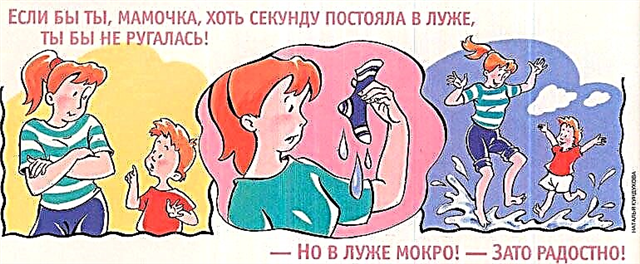Hi everyone! Today we will talk about one of the most painful topics for parents: what to do when children in the same family are fighting? They can be brothers, sisters. And suddenly there are fights in the family!
Video. Psychologist Marina Romanenko.In this video, we are talking about the most painful topic for parents - children's fights in the family. Psychologist Marina Romanenko talks about the reasons for the quarrels of brothers and sisters, how to quickly calm them down, and where not to get involved in the conflict at all:
[sc name = ”rsa”]
Text version:
Children are fighting among themselves: what to do?
The most important thing to understand at this point in time is that almost everyone who had brothers or sisters fought among themselves. Therefore, this is such a topic that everyone has faced, like being little, if he had a brother or sister, or becoming a parent, when we had more than one child. And there are certain rules on how to act so that fights, in general, cease to take place, and the relationship between children remains very good.
Why do children fight?
1. Because of toys
The first reason children can fight is because of toys, where one pretends to be the other's toys. The elder, as a rule, protects his own and does not want to give, and this is a reason for quarrels.
2. Because of things
The second - sometimes it happens: the children have grown up, they begin to carry each other's things, and at home they simply “A-ah!” already in adolescence, when one sister put on another sister's things, or shoes, or a bag without asking, right? This is also a moment that may be the reason why children fight.
3. To get attention
And they can also fight, because they attract the attention of their parents so much, they want to win, pay a little more attention to themselves.
4. To restore justice
And one more point, which I often came across, why children in a family can fight, is because they want to restore some kind of justice. The elders, as a rule, sometimes get so fed up with custody, and the fact that the younger ones are always protected, or that they claim their property, that they just sometimes quite unexpectedly can start a fight, well, to let off steam, and to somehow protect themselves , their integrity, and their property in the family.
What do parents need to do?
1. Separate toys
The first thing I want to say - if children are fighting over toys, please share the toys! There are no common ones. It does not happen that the younger has the right to take a toy from the elder. No! Please define: the elder's toys by right, if they were bought or presented to him. And they do not pass by inheritance, they remain with him, if he does not decide to give them to someone else.

When the second child is born in the family, buy him your set of toys. It is not automatically implied that if the elder has not played with the typewriter for three years, then it can be given to the younger, and hope that he will not see it. The first thing he will do is go, take it, and say that it is mine! On your "You haven't played for three years!" he will say: “So what! This is my toy! "
And if you persuade him, at this moment, it is not clear why, the parent suddenly decides to love more than the younger, not the older, to break the character of the older child, not to respect him, in order to give the younger one a toy for some reason. Listen, buy him his toy set! And the elder should have his own toys, and this is sacred!
And teach the children to ask each other: "Can I take a toy from you?" And give permission, especially the elder one, to say: "No, you can't!" Then calm down the younger, if he cries, take him somewhere, switch him. But the rule remains the same - teach them to ask each other! And if they did, then yes, of course, take it. If not allowed, you cannot take.
I would also warn the elders that the younger will crawl everywhere. And if your toys lie where he can easily reach, remove them from there if you do not want to give them. In order not to create these conflicts, so that you do not want to protect the younger one where, in fact, he, in general, does not need protection.
2. Separate things
Second, when they fight over things, it's the same story: two shelves, things. Sometimes you have to buy even exactly the same, because the younger wants the same as the older one. Buy the same!
And introduce the same rule: ask, you can take, or you can't take. Nothing can be taken without demand. In this way, you cultivate self-esteem, respect. And the world will not bend in front of your child, who is accustomed to taking other people's things without asking or with impunity. This is strange. He can't go outside, take your car without asking, and leave? Why then can he take another thing or toy? Asking is a culture that will definitely not be superfluous in the family!
3. Pay attention to both children.
The next moment is when the children are fighting among themselves, getting your attention. Just think that each of them wants a piece of you. Sometimes they want it at the same time. A small child hugs you, the older one can push him away. I know one who said: "This is my mother!"
When the youngest is born in the family, the elder suddenly begins to share his beloved mom and dad with someone else. Obviously, sometimes he will try to push everyone away, so that all the attention, as before, was given to him. So understand this. It is not necessary to protect the baby with all his might, it is only necessary that he never be in the line of fire when the forces are not equal. But pay attention to the elder, pay attention to the younger.
- Why is the older child jealous of the younger? What should parents do?
- My mum! Only mine! - or a few words about childhood jealousy
Sometimes you have to do this at the same time. One in your arms, the other in your arms. This kiss, this kiss. Just don't say that you love them the same, it doesn't work. All they hear ... They secretly count the kisses that everyone got.
Remember that you need to spend as much time with the elder as the younger. Not only at the moment when they physically demand it from you, but also at other moments. Then you will reduce the number of fights that relate exactly to the fact that you pay attention to them and give your warmth, love, care. And they showed another in quotes which of the children is more important in the family.
Try to prevent this by hugging and kissing your child, one and the other, as often as possible, saying that you love them. But you don't love them. "I love you!", Passing by. "I love you!" walked past. Everyone wants to be the center of the universe! Give them the feeling that they are the center of the universe!
4. Do not introduce double standards
You know, do not introduce double standards into the family yet. This can also be the reason why children can conflict or fight in the family, when one gets more, the other for some reason gets less. already if divided, then in half, immediately and always.
And the key to the success of parents in families where there is more than one child is not to take sides. You cannot be on the side of one, or on the side of the other. You are a parent, you love your children equally, and you cannot take sides, you have no such right.
We must reduce the number of fights that can take place there for the reasons we have just named. But it's best not to get involved. What do I mean when I say, "Don't interfere"?
[sc name = ”rsa”]
When children came running to you, like mine, for example, they came running to me: “Oh, this one hit me! This one hit me! " I say: well, why did they come running? They are, like, waiting for me to tell someone that he is right, and to someone - wrong. I say: “Quickly from me, and sort it out there! Come and tell me that you have already made up! " And they came running and said: “We are already doing well! We have already made up! " Excellent!
Somewhere in this way, not taking sides, send them to sort it out among themselves, in a comic form showing that you do not, do not, do not play these games, you do not drag yourself to one side.
5. Be always there
Another very important rule that parents must follow. When you have children, and they have conflicts, of course, you should be there. What's next? The younger the children, the closer to them physically you should be, two or three steps, sometimes one step. But if suddenly something - you just, and spread them in different directions, and they can not harm each other.
Children are starting to be a little older, well, you may be three, four meters away, but they are always in your field of vision. You cook and watch over them. You cannot hope that while you do something quickly in the kitchen, the room will be quiet. Drag the rug into the kitchen so that the children play next to you, and are under your ... Well, not that vigilant control, no, but so that you can quickly respond if you suddenly need your help.
When the children are the same old age, and they are small, or twins, and they are small, they can rarely cause serious damage to each other, so you are there, look, if necessary - separate.
But when the difference between children is two or three years, it means that you can be the parent of a one-year-old child and a three-year-old child, three, six or eight years old, and then, if a fight starts, then the forces are not equal. The one who is taller, bigger, stronger, he, as a rule, can hit harder. Accordingly, at this moment you should also be near, and be ready to separate. Remember, you cannot take sides!
[sc name = ”ads”]
Sometimes it will work if you just take out the younger one and transplant it there on the other side of you, and for a while say: "No, no, no, you play separately, because you definitely cannot be together!" Separately.
Try to tell the children as little as necessary: "You can't fight!" or some other stuff, because they don't just fight like that. Children generally never do anything for nothing. There is a reason. And you may not know her. You are not involved in their conversations, you are not one of them, you do not feel what they are feeling, so the reason may elude you. Separate them simply! Put one in one direction, the other in the other direction, and for a while, until the passions subside, do not let them converge.
Know your kids love each other, that's for sure. But as soon as you start to take sides, the sense of justice of the child, whose side you did not take, begins to escalate. And at this moment, you make such a crack in their relationship. The rules that say about the family work very well here: "Lovely ones scold - they only amuse themselves!" Here we quarreled, here we made up, here we play further. So are your children: they quarreled here, made peace here, live on here, play here, love each other.
Just be careful so that they cannot harm each other, separate them in time, and know that this age will pass. And if you did not take sides, did not sharpen the sense of justice, your children will live for a long time, peacefully, already as adults, support and help each other. And they will not accumulate unspoken resentment against a brother, sister, or brothers, or sisters, stretching from deep childhood.



